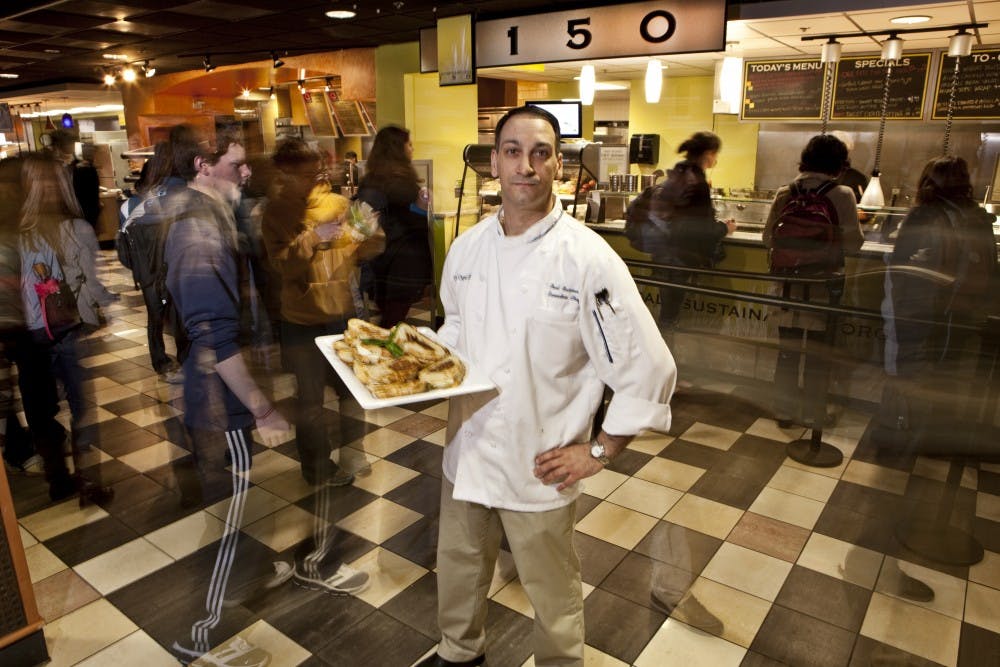When Carolina Dining Services first started offering sustainable food last year, the menus looked a lot like what they were already serving.
Executive Chef Paul Basciano was struggling to find enough local ingredients, and students weren’t backing the offerings with their dollars — two continuing challenges to UNC’s efforts to provide more sustainable dining options.
“I would put a menu together and then start calling local farmers, finding out they couldn’t keep up with our demand,” Basciano said.
Then Basciano changed tactics. Now, “I don’t write a menu until I know what they have.”
Sales at 1.5.0. in Lenoir, which opened in January, are so far exceeding expectations. Basciano credits the unique menu and the sustainable focus.
“I try to cook fresh, interesting food you can’t get anywhere else on this campus,” he said.
A way of doing business
The idea was born from lobbying by student and community groups, who wanted CDS to offer sustainable food in campus dining halls.
The compromise was 1.5.0. — a test to see if sustainable food could be sourced and sold on campus. Basciano was asked to create a retail location dedicated entirely to sustainable food; making it work has required close collaboration with local farmers, which isn’t easy for an organization UNC’s size.
“It’s an administrative as well as a culinary process,” CDS Director Scott Myers said. “The difficult part is tracking where your food comes from and finding ways to source it. You find all kinds of challenges doing that.”
CDS serves more than 10,000 meals a day and purchases millions of dollars of food every year. Its purchasing power has significant effects on the economy and, in particular, on the North Carolina food industry. The University purchased 13 percent of its food last year from 29 local growers in North Carolina, Myers said.
Dining services operates two sustainable food retail locations: 1.5.0. and Greens at The Beach Cafe near the medical school. Some sustainable food is also offered at Lenoir and Rams Head dining halls, including grass-fed beef and free-range eggs.
One challenge is volume: college dining halls, hospitals, corporate cafeterias and other large venues serve a lot of food. Most farmers at local farmer’s markets could not provide enough alone, organic or otherwise. National food distributors like Sysco can.
“The industry is built on trying to maximize efficiency,” said Myers. “So when you talk about going to small, local farms, you’re creating a different way of doing business.”
Eastern Carolina Organics is one group trying to make it easier for smaller farms to sell their products. They distribute food produced by smaller farms to organizations and schools such as Duke University, Guilford College in Greensboro and Averett University in Virginia.
But even groups like Eastern Carolina Organics often cannot provide the services larger cafeterias like UNC need.
“It’s important to think about it not just from a financial perspective but also from a prep perspective,” said Sandi Kronick, ECO’s CEO.
“There’s a lot of different work that a kitchen needs to do if they’re getting food that’s fresh and raw and not processed.”
Alice Ammerman of UNC’s Gillings School of Global Public Health said medium-sized North Carolina farms may be the answer.
These farms, which produce too much to be able to sell solely at farmers markets but not enough to supply large distributors, find themselves caught in the middle.
Ammerman’s hope is that farms like this can connect with groups such as UNC.
A limited budget
The cost of supplying a place like UNC with sustainable food is yet another hurdle. Even where sustainable food is available, it tends to cost more.
Buying local and organic ingredients in high volume usually costs 200 percent to 250 percent more than regular food, Basciano said.
“It basically comes down to economics,” said senior Jordan Treakle, co-founder of FLO (Fair, Local, Organic), a student group that advocates for sustainable food on campus. “They have to be able to provide food for students, they have a limited budget, and some of these foods cost more.”
Many other universities with leading sustainable food initiatives, such as Yale University, either require students to purchase meal plans (providing consistent funding) or receive special grants. UNC does neither.
Despite the higher price tag, Myers and Basciano report that sales of sustainable food are considerably higher than expected. This is encouraging news for FLO and other groups pushing for even more sustainable options.
The success of 1.5.0. will help the University make future sustainable food decisions.
“Anything we can do that is financially viable, we should be doing, and hopefully we’re already doing,” said Myers.
Contact the University Editor at udesk@unc.edu.




